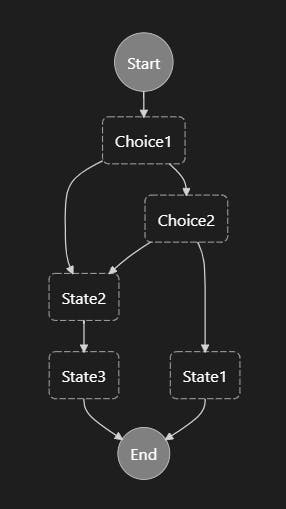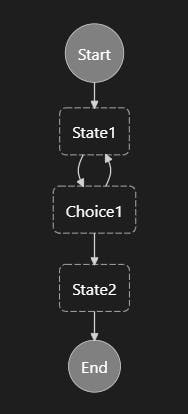In my previous post, I started to implement my alternative API for defining state machines in CDK. In this post, I continue this and, after a few bumps in the road, get a usable version finished and tested.
The code for this post can be found in the GitHub repo here.
Edit: The resulting code is now available as an npm package.
As we left in in Part 2, we still had the following functionality to implement.
- Map states
- Parallel states
- Error handlers
Unbeknownst to me at this point, there would also be other challenges when I started to consider some of the more involved state machine scenarios.
If you recall, in our design, Map states are defined as follows.
.map('Map1', {
itemsPath: '$.Items1',
iterator: new StateMachineBuilder()
.perform(state1)
.perform(state2)
.perform(state3)
.perform(state4),
})
With Parallel states defined like this.
.parallel('Parallel2', {
branches: [
new StateMachineBuilder().perform(state5).perform(state6),
new StateMachineBuilder().perform(state7).perform(state8),
],
})
In both cases, the idea is that the 'sub-states' are built by defining separate StateMachineBuilder instances. When build is called, we should be able to call build on the 'sub-states' and obtain an appropriate IChainable instance.
As with the perform and choices steps in Part 2, I needed new BuilderStep classes to capture and hold the details of the states to create.
class MapStep implements BuilderStep {
// Snip
}
class ParallelStep implements BuilderStep {
// Snip
}
With these in place, I could amend the following methods to store the steps for later use by the build method.
map(id: string, props: BuilderMapProps): StateMachineBuilder {
this.steps.push(new MapStep(id, props));
return this;
}
parallel(id: string, props: BuilderParallelProps): StateMachineBuilder {
this.steps.push(new ParallelStep(id, props));
return this;
}
With the new step types being added, I needed to extend the switch in getStepChain to call new methods that return an appropriate IChainable instance.
case StepType.Map:
stepChain = this.getMapStepChain(scope, stepIndex);
break;
case StepType.Parallel:
stepChain = this.getParallelStepChain(scope, stepIndex);
break;
Implementing getMapStepChain and getParallelStepChain required a very similar approach. In both cases, the build method is called on TODO
- Create the state
- Create the sub-state by invoking
buildwith thescope - Add the sub-state to the current state
- Wire up the next state, if there is one
The difference between the two being that the Parallel state can have multiple sub-states.
private getMapStepChain(scope: cdk.Construct, stepIndex: number): sfn.IChainable {
//
const step = this.steps[stepIndex] as MapStep;
const map = new sfn.Map(scope, step.id, step.props);
map.iterator(step.props.iterator.build(scope));
const stepChain = this.hasNextStep(stepIndex)
? map.next(this.getStepChain(scope, stepIndex + 1))
: map;
return stepChain;
}
private getParallelStepChain(scope: cdk.Construct, stepIndex: number): sfn.IChainable {
//
const step = this.steps[stepIndex] as ParallelStep;
const parallel = new sfn.Parallel(scope, step.id, step.props);
step.props.branches.forEach((branch) => {
parallel.branch(branch.build(scope));
});
const stepChain = this.hasNextStep(stepIndex)
? parallel.next(this.getStepChain(scope, stepIndex + 1))
: parallel;
return stepChain;
}
Using the examples created in Part 1 and the testing approach in Part 2, I was able to verify that StateMachineBuilderwas behaving as expected and outputting the equivalent definition.
The final part in the puzzle, or so I thought, was to implement error handlers. The API design for defining these was for a catches array on the appropriate props passed in to each method, an example of which is shown below.
.perform(function1, {
catches: [
{ errors: ['States.Timeout'], handler: 'Catch1' },
{ errors: ['States.All'], handler: 'Catch2' },
],
})
.map('Map1', {
itemsPath: '$.Items1',
iterator: new StateMachineBuilder().perform(state1).perform(state2),
catches: [{ handler: 'Catch5' }],
})
.parallel('Parallel1', {
branches: [
new StateMachineBuilder().perform(state3),
new StateMachineBuilder().perform(state4),
],
catches: [{ handler: 'Catch6' }],
})
All looking pretty straightforward I thought, all I needed to do was iterate over the catches and invoke the addCatch method with with the IChainable for the handler state.
private getPerformStepChain(scope: cdk.Construct, stepIndex: number): sfn.IChainable {
//
const step = this.steps[stepIndex] as PerformStep;
const stepState = (step as PerformStep).state;
step.props.catches.forEach((catchProps) => {
const handlerStepIndex = this.getStepIndexById(catchProps.handler);
const handlerChainable = this.getStepChain(scope, handlerStepIndex);
stepState.addCatch(handlerChainable, catchProps);
});
const stepChain = this.hasNextStep(stepIndex)
? stepState.next(this.getStepChain(scope, stepIndex + 1))
: stepState;
return stepChain;
}
However, there was one snag as shown below.
Property 'addCatch' does not exist on type 'INextableState'. Did you mean '_addCatch'?
It turned out that addCatch is only on TaskStateBase. My solution was to remove PerformProps from the perform method and rename it to TryPerformProps. I then created a new method called tryPerform that takes a TaskStateBase instead.
tryPerform(state: sfn.TaskStateBase, props: BuilderTryPerformProps): StateMachineBuilder {
this.steps.push(new TryPerformStep(state, props));
return this;
}
I could then use my original approach for a new getTryPerformStepChain method, and was able to call the addCatch method as intended. The same pattern could then be repeated for map and parallel, but taking into account the fact that the catches are optional in these cases.
export default class StateMachineBuilder {
// Snip
private getMapStepChain(scope: cdk.Construct, stepIndex: number): sfn.IChainable {
// Snip
if (step.props?.catches) {
step.props.catches.forEach((catchProps) => {
const handlerStepIndex = this.getStepIndexById(catchProps.handler);
const handlerChainable = this.getStepChain(scope, handlerStepIndex);
map.addCatch(handlerChainable, catchProps);
});
}
// Snip
}
private getParallelStepChain(scope: cdk.Construct, stepIndex: number): sfn.IChainable {
// Snip
if (step.props?.catches) {
step.props.catches.forEach((catchProps) => {
const handlerStepIndex = this.getStepIndexById(catchProps.handler);
const handlerChainable = this.getStepChain(scope, handlerStepIndex);
parallel.addCatch(handlerChainable, catchProps);
});
}
// Snip
}
}
All was looking promising, but running the unit tests resulted in the following failure.
+ expected - actual
"expressionAttributeValues": {
"$.Var1.$": "$.Var1"
}
}
- "Resource": "${Token[TOKEN.241]}"
+ "Resource": "${Token[TOKEN.157]}"
"Type": "Task"
}
As far as I understand it, the issue here is down to the way that CDK generates placeholders in the definition to link to resources later on. For our purposes, we do not care what resource this will point to. Given this, I wrote the following method to replace all token references, such as [TOKEN.241], with the generic value [TOKEN.n].
function getComparableGraph(builderStateMachine: StateMachineWithGraph) {
const graphJson = builderStateMachine.graphJson;
const comparableGraphJson = graphJson.replace(/\[TOKEN\.[0-9]+\]/g, '[TOKEN.n]');
return JSON.parse(comparableGraphJson);
}
In the unit tests, I amended to comparison to use the new method to compare the results.
expect(getComparableGraph(builderStateMachine)).to.deep.equal(
getComparableGraph(cdkStateMachine)
);
With this changes, all the unit tests were passing and I felt pretty good. However, I thought about other state machine scenarios and, in particular, the scenario where there is a common downstream state as shown below.

This scenario is simple enough to define using our API.
const definition = new StateMachineBuilder()
.choice('Choice1', {
choices: [{ when: sfn.Condition.booleanEquals('$.var1', true), next: 'State2' }],
otherwise: 'Choice2',
})
.choice('Choice2', {
choices: [{ when: sfn.Condition.booleanEquals('$.var2', true), next: 'State2' }],
otherwise: 'State1',
})
.perform(state1)
.end()
.perform(state2)
.perform(state3)
.end()
However, when testing I got the following error.
Error: State 'State2' already has a next state
at Pass.makeNext (node_modules\@aws-cdk\aws-stepfunctions\lib\states\state.ts:287:13)
at Pass.next (node_modules\@aws-cdk\aws-stepfunctions\lib\states\pass.ts:137:11)
at StateMachineBuilder.getPerformStepChain (src\constructs\StateMachineBuilder-v1.ts:196:19)
at StateMachineBuilder.getStepChain (src\constructs\StateMachineBuilder-v1.ts:163:26)
Thinking about it, this made sense. The code would have already traversed one path to State2 through a branch of Choice1, and then invoked the next method. Given this, my thought was to cache the IChainable values for all visited steps. We could then return the cached instance and avoid multiple calls to next.
export default class StateMachineBuilder {
// Snip
private readonly stepChainByIndex = new Map<number, sfn.IChainable>();
// Snip
private getStepChain(scope: cdk.Construct, stepIndex: number): sfn.IChainable {
//
const visitedStepChain = this.stepChainByIndex.get(stepIndex);
if (visitedStepChain !== undefined) {
return visitedStepChain;
}
// Snip
this.stepChainByIndex.set(stepIndex, stepChain);
return stepChain;
}
// Snip
}
Re-running the unit tests resulted in smiles all round, as the fix had done its job. However, another scenario came to mind, that of loops. I quickly put together another unit test, this time featuring a Choice state that looped back to higher up the state machine.

Again, it was quite simple to replicate the state machine using our API.
const definition = new StateMachineBuilder()
.perform(state1)
.choice('Choice1', {
choices: [{ when: sfn.Condition.booleanEquals('$.var1', true), next: 'State1' }],
otherwise: 'State2',
})
.perform(state2)
What was not quite so simple, was the following error.
Error: There is already a Construct with name 'Choice1' in Stack [BackwardsLoop-Builder]
at Node.addChild (node_modules\constructs\src\construct.ts:534:13)
...snip...
at new Choice (node_modules\@aws-cdk\aws-stepfunctions\lib\states\choice.ts:50:5)
at StateMachineBuilder.getChoiceStepChain (src\constructs\StateMachineBuilder-v2.ts:258:23)
at StateMachineBuilder.getStepChain (src\constructs\StateMachineBuilder-v2.ts:180:26)
This had me stumped for a bit. The solution came from looking at the CDK version.
const definition = sfn.Chain.start(
state1.next(
new sfn.Choice(definitionScope, 'Choice1')
.when(sfn.Condition.booleanEquals('$.var1', true), state1)
.otherwise(state2)
)
);
Here, the when is being invoked on the Choice before the next is invoked on state1. In StateMachineBuilder, the when was being invoked after the next. The underlying code must be traversing the next link and trying to add Choice1 state for a second time.
The solution was store the State instances in a lookup, before recursively calling getStepChain. With this lookup in place, the getStepChain method could resolve a step to a visited state, but before it had been wired up to any others.
export default class StateMachineBuilder {
// Snip
private readonly stepStateByIndex = new Map<number, sfn.State>();
private getStepChain(scope: cdk.Construct, stepIndex: number): sfn.IChainable {
//
const visitedStepState = this.stepStateByIndex.get(stepIndex);
if (visitedStepState !== undefined) {
return visitedStepState;
}
// Snip
}
private getPerformStepChain(scope: cdk.Construct, stepIndex: number): sfn.IChainable {
//
const step = this.steps[stepIndex] as PerformStep;
const stepState = (step as PerformStep).state;
this.stepStateByIndex.set(stepIndex, stepState);
const stepChain = this.hasNextStep(stepIndex)
? stepState.next(this.getStepChain(scope, stepIndex + 1))
: stepState;
return stepChain;
}
// Snip
}
This pattern was then repeated in the other methods and the tests were re-run. The result was success, but I was not quite convinced. I added a few more tests, but all seemed well. It appeared we had a working API. One other thing did bug me though, as I was aware of quite a bit of repeated code. As a result, I did a bit of refactoring whilst continuing to run the unit tests. The result can be found here.
Edit: The StateMachineBuilder component is now available on npm.

